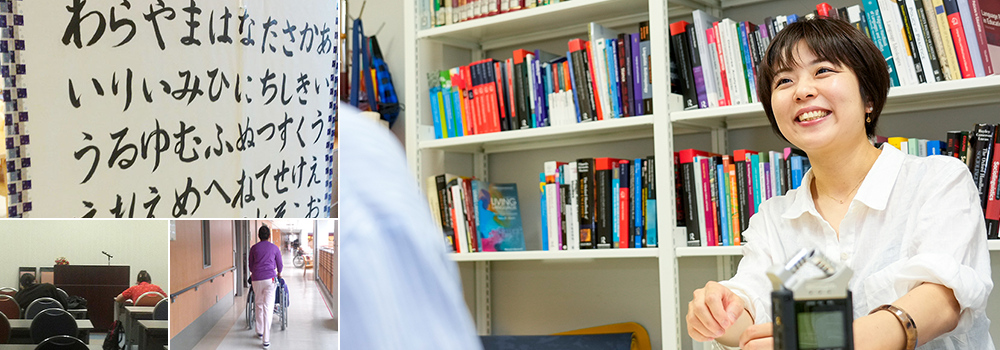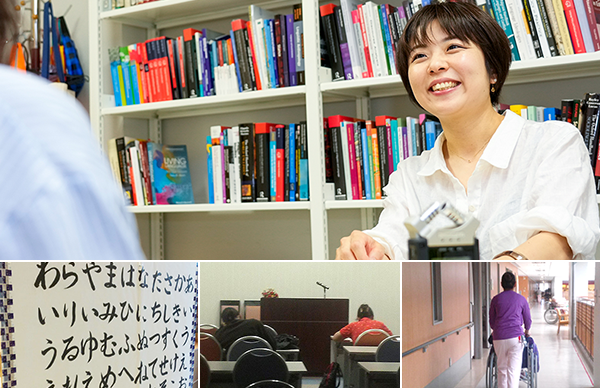

Investigaging language policy formulated outside “language policy proper”
My research interests have focused on social/public policies that at first glance appear not to be language (education) policies but in fact function as such. In addition to the commonly-percived form of language (education) policies, which are formulated by the national government, I pay attention to meso-level langauge policies formulated at the organizational level, such as schools and companies.
Since the fields of sociolinguistics, applied linguistics, and linguistic anthropology are far-reaching, my research interests described above do not necessarily overlap with the themes of my supervisees and joint research.
For more information on the joint research and the themes of my superviesees, please view "Research Projects" and "Supervision" in the "Profile" section below, respectively.

For Kenkyusei (研究生, Research student) program applicants:
No formal contsent is required from me.
For prospective masters's/doctoral students:
Please contact me by email if you are thinking of me as a potential supervisor.
Profile
- About myself
- Major publications
- Conference presentations
- Research projects
- Research grant received
- Award, academic society, social service
- Caourses taught
- Supervision
Affiliation
- Present: Associate Professor (Hokkaido University)
- 2018 – 2020: Assistant professor (Hokkaido University)
Education
- 2013 – 2017
The University of Hong Kong (Hong Kong)
PhD, Faculty of Education - 2010 – 2012
Australian National University (Canberra, Australia)
MA (Applied Linguistics), School of Literature, Languages and Linguistics - 2005 – 2009
Waseda University (Tokyo, Japan)
BA (English literature and English language education)
Books
- Otomo.Ruriko. (2023). Linking Language, Trade and Migration: Economic Partnership Agreements as Language Policy in Japan. Springer Cham.
- Otomo, Ruriko. (2020). The policy and institutional discourse of communication ability: The case of (migrant) eldercare workers in Japan. In Kellie Gonçalves & Hellen Kelly-Holmes (Eds.), Language, Global Mobilities, Blue-Collar Workers and Blue-collar Workplaces (pp. 147-163). London: Routledge.
- Otomo, Ruriko. (2019). Language and migration in Japan. In Patrick Heinrich & Yumiko Ohara (Eds.), Routledge Handbook of Japanese Sociolinguistics (pp. 91-109). London: Routledge.
- Otomo, Ruriko. (2019). Language policy and planning in Japan. In Patrick Heinrich & Yumiko Ohara (Eds.), Routledge Handbook of Japanese Sociolinguistics (pp. 299-325). London: Routledge.
- Butler, A, Otomo, Ruriko, Zhou, Z, & Yoshimoto, K. (2013). Treebank Annotation for Formal Semantics Research. In Y Motomura, A Butler, & D Bekki (Eds.), New Frontiers in Artificial Intelligence (Vol. 7856, pp. 25-40). Berlin, Heidelberg: Springer.
Journal articles
- Otomo, Ruriko. (2025). The language part of (eldercare) work and its implication for language policy study. The International Journal of the Sociology of Language, 292: 137–141.
- Otomo, Ruriko. (2022). The discourse of self-learning: An analysis of Japan’s EPA programme for healthcare workers from Southeast Asia. Asian Studies Review, 46(4), 593-612.
- Otomo, Ruriko. (2020). Healthcare, language and a free-trade agreement: Institutional logics of on-the-job Japanese language training for migrant healthcare workers. Multilingua, 39(3)(3), 343-367.
- Otomo, Ruriko. (2016). New Form of National Language Policy? The Case of the Economic Partnership Agreement (EPA) in Japan. The Asia-Pacific Education Researcher, 25, 736-742.
- Otomo, Ruriko. (2012). English language testing of very young children: The case of Japan. Cogent Education, 3(1). doi:https://doi.org/10.1080/2331186X.2016.1209802
Dissertation
- Otomo, Ruriko. (2017). Japan’s economic partnership agreement as language policy: Creation, interpretation, appropriation. PhD dissertation. The University of Hong Kong. Hong Kong, PRC.
Conference presentation
- Ruriko Otomo, Academics as language policy arbiters (Jun 13, 2021)
- Ruriko Otomo, Language and migration in the age of graying society, MIRAI 2.0 Research and Innovation Week 2021 (Jun 9, 2021)
- Ruriko Otomo, Outcomes of multilingual resilience in contemporary Japan: Panel Description, Sociolinguistics Symposium 23 (Jun 7, 2021)
- Ruriko Otomo, The making of “ideal” Japanese language learners and teachers: An analysis of the Japan’s EPA program for healthcare workers from Southeast Asia, The 11th International Convention of Asia Scholars (Jul 18, 2019)
- Ruriko Otomo, Narratives of Japanese-Chinese bilingual BPO workers, International Society for Language Studies (Jun 20, 2019)
- Ruriko Otomo, The Discourse of Self-learning: Insights from a Language Policy Study, The 2019 Conference of the American Association for Applied Linguistics (Mar 9, 2019)
- Ruriko Otom, The Making of Docile Foreign Healthcare Workers: The Case of Japan’s Economic Partnership Agreements with Southeast Asian Countries, Sociolinguistic Symposium 22 (Jun 28, 2018)
- Ruriko Otomo, Researcher positionality in language policy research, Language and Future Academic Conference and the 4th Emerging Scholars’ Workshop (Aug, 2017)
- Ruriko Otomo, Free-trade agreements and the commodification of migrant healthcare workers: The case of Japan, The 11th International Symposium on Bilingualism 11 (Jun 15, 2017)
- Ruriko Otomo, What’s behind language problem talks?: Implementational and ideological space for the Economic Partnership Agreement as a language policy, The 2017 conference of the American Association for Applied Linguistics (Mar, 2017)
- Ruriko Otomo, Language policy in an elderly care home in Japan: Local interpretation and appropriation of the Economic Partnership Agreement, International Symposium on Japanese Language Education and Japanese Studies (Nov, 2016)
- Ruriko Otomo, The ethnography of language policy in an elderly care home in Japan: The case of the Economic Partnership Agreement (EPA), Multidisciplinary Approaches in Language Policy and Planning (Sep, 2016)
- Tao, Jian, Ruriko Otomo, Language policy in a private English language school in Japan: A teacher’s experience, The 3rd Emerging Scholars’ Workshop ‘Linguistic diversity: Challenges and responses’ (Aug, 2016)
- Ruriko Otomo, Analyzing a language policy process in the Economic Partnership Agreement, The 3rd Emerging Scholars’ Workshop ‘Linguistic diversity: Challenges and responses’ (Aug, 2016)
- Ruriko Otomo, Trade agreement and commodification of migrants, Symposium on Commodification and Consumption of Language Education (Jul, 2016)
- Ruriko Otomo, Language policy in super-aged Japan: The case of the Economic Partnership Agreement, Linguapax Asia International Symposium (Jun, 2016)
- Ruriko Otomo, Language policy in super-aged Japan: The case of the Economic Partnership Agreement, Multidisciplinary Approaches in Language Policy and Planning, (Sep, 2015)
- Tollefson, James W, Ruriko Otomo, The ideological construction of teachers in post-Fukushima, The 2015 conference of the American Association for Applied Linguistics (Mar, 2015)
- Tao, Jian, Ruriko Otomo, The complex construction of teacher identity in a private English language school: A case of a Japanese bilingual teacher, The 5th Hong Kong Association for Applied Linguistics Conference (Jun, 2014)
- Butler, Alastair, Hotta, Tomoko, Otomo, Ruriko, Yoshimoto, Kei, Zhou, Zhen, Zhu, Hong, Keyaki Treebank: Phrase structure with functional information for Japanese, Text Annotation Workshop (Aug, 2012)
Invited talk
- Ruriko. Otomo, Language and Healthcare Work: Focusing on Trade, Migration, and Policy Discourse. Language and Identity Series. Tokyo College, the University of Tokyo (Jun, 2023)
- Tao, Jian, Ruriko Otomo, The complexity of teacher identity in a private English language school: a case of a Japanese teacher, Symposium on Commodification and Consumption of Language Education (Jul, 2016)
Individual research project
- 2020 – 2025: Reconsidering “language problems” of foreign caregivers in Japan: An approach from the ethnography of language policy (KAKENHI-PROJECT-20K13021, Grant-in-Aid for Young Scientists, Japan Society for the Promotion of Science)
Collaborative research
- 2019 – 2024: L2 speakers in multi-layered language environments: Translanguaging conversation strategies (KAKENHI-PROJECT-19H01276, Grant-in-Aid for Scientific Research (B), Japan Society for the Promotion of Science)
- 2020 – ongoing: Harassment in Fieldwork (HiF)
For more information, please visit at https://safefieldwork.live-on.net/
Grant-in-Aid for Scientific Research
- 2019 – 2024: Grant-in-Aid for Scientific Research (B) (Collaborative researcher, L2 speakers in multi-layered language environments: Translanguaging conversation strategies)
- 2020 – 2025: Grant-in-Aid for Young Scientists (Principal investigator, Reconsidering “language problems” of foreign caregivers in Japan: An approach from the ethnography of language policy
Other
- 2020 – 2022: Support system for joint research between three designated partner universities (Hokkaido University, Tohoku University, and Nagoya University) under the Comprehensive Cooperative System for Fostering Researchers with Doctoral Degrees (https://cofre.synfoster.hokudai.ac.jp/cgi-bin/index.pl?page=index&view_category_lang=2)
- 2022 – 2023: FY2022 Research Grant for the promotion of Diversity, Equity, and Inclusion (Hokkaido University)
- 2023 – 2024: MIRAI2.0 – Joint seed funding of Japan-Sweden collaborative projects and short courses
- 2020 – Present
Sociolinguistics (Fuji Women’s University) - 2019 – Present
Language in society: An introduction to sociolinguistics (Hokkaido University) - 2020 – Present
Sociolinguistics: Language and Wellbeing (Hokkaido University, Summer Institute Course)
MA
- A Study of Japanese University Students’ Perspectives about the TOEIC Test
- A Study of Japanese Language Education Policy at the University of Belgrade in Serbia: Based on an Interview Survey with Japanese Language Teachers
Research
I am engaged in research that considers language practices (including language systems, language use, discourse, language attitude, and language education practices and systems) from historical, political, and social perspectives.
Although I do not have a specific "language" or "field" of expertiese, I mainly conduct research to unravel the relationship between language and society surrounding Japan, and to explore language ideologies that are deeply seated in language policy.
To do so, I adopt approaches of sociolinguistics, applied linguistics, linguistic anthropology and draw on ethnography, fieldwork, interviews, and critical discourse analysis.

Fieldwork at Ikema Island, Okinawa, Japan
(Photo: Ruriko Otomo)
Access
Hokkaido University
Graduate School of International Media, Communication, and Tourism Studies/Research Faculty of Media and Communication
Kita 17, Nishi 8, Kita-ku, Sapporo
Hokkaido, 060-0817
Japan
Contact
Phone: +81(11)-706-5375
E-mail: rotomo(at)imc.hokudai.ac.jp



